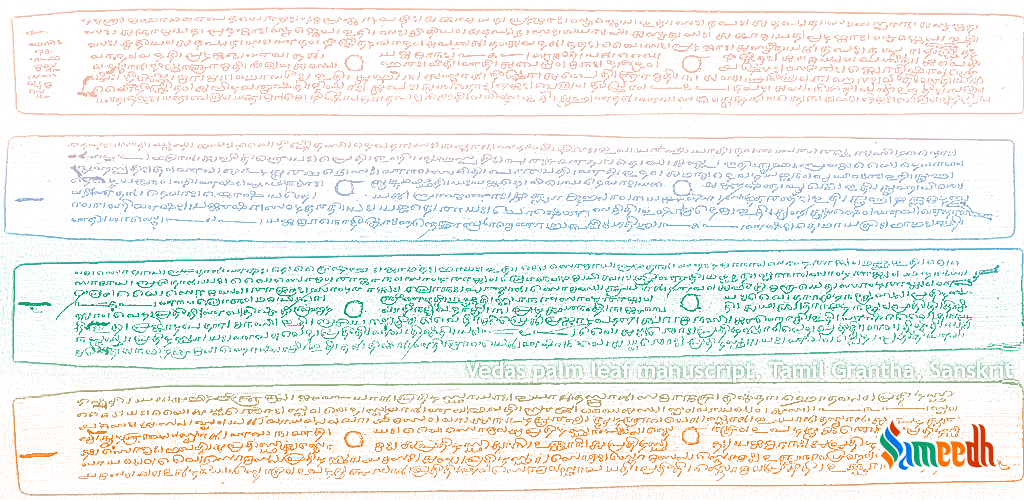The fourteen types of abodes of knowledge in Hinduism and their relevance

Manuscripts of the Vedas; Image Source: Ms Sarah Welch
Vidhya refers to knowledge in Sanskrit. In Hinduism, there are fourteen such reservoirs of knowledge, philosophy, religious scriptures, upon reading which one can navigate through life better with such immense wisdom. Vidhya in Hinduism is not bound by philosophical theories alone, it extends its branches to the fields of arts, spirituality, religion and sciences as well. Vidhya also means the techniques of performing various acts or essentially knowing how to go about several tasks. Majorly, this abode of knowledge is to acquire a certain closeness with the higher power by understanding and learning about the different realms and facts of the Universe.
The fourteen Vidhyas are divided between scriptures from various periods.
4 Vedas
The word Veda in itself means knowledge, each of the following expanding in some form as a branch of information.
- Rig Veda / Rugved
Rugved, the earliest form of Veda contains the hymns, to recite as praises of the lord, expressing gratitude towards his creation and grandeur. - Sam Veda / Samved
Samved covers the initial instances of singing songs and mantras devoting towards god. - Yajur Veda / Yajurved
Yajurved consists of all the prayers used during rituals or yagnas and other holy events for the supreme forces. - Atharva Veda / Atharvaved
Atharvaved has multiple hymns and charms of magic which can be recited and used to evoke certain energies to bring changes in nature.
4 Upavedas
These 4 texts supplement the Vedas and describe the traditional sciences.
- Arthashastra
Arthashastra is the ancient art about warcraft, military tactics, statesmanship, economic strategies in Hinduism as mentioned in Vedic scriptures by the writers Kautilya and Vishnugupta. - Dhanurveda
Dhanu translates to bow and Veda is simply knowledge, signifying the science or technique of archery. It elaborates on the best, powerful strategies that can be learnt for better performances. - Gandharva Veda
This is the artistics Veda covering various forms of performing arts, dances and even theatre. It explains the nuances and beauty of these arts. - Ayurveda
This word stems from Ayus, meaning longevity and explains the knowledge or science of life. It is also seen as the medicinal branch of Hinduism, working towards sustaining life, recovering from damages and overall ensuring good health and well being.
6 Vedangas
These are an extension of the Vedas, hence the name Vedanga, where “ang” means limb.
- Shiksha
It is the phonetics of the language. The goal through this phonology teachings is to impart accurate understanding of pronunciations to recite, hymn songs and chant mantras of praises in Sanskrit. - Kalpa
It is the art of performing rituals. - Vyakaran
This is the grammar of the Sanskrit language with its roots originating in ancient Vedic India. Astadhyayi of Panini is a renowned work of it. - Nirukta
It is a crucial Vedanga as it revolves around the etymology of words to get to the root of it. According to ancient Vedic scriptures, there are certain sutras or rules to be followed to derive word meanings and to form new words from those. It refers to the glossary of the language. - Chhanda
Just like in English poetries there are metres such as iambic pentameter, trochaic octameter etc, Sanskrit poetries too have the same known as Chanda. - Jyotish
Jyotis are heavenly bodies and this Vidhya circles around arts which have to do with celestial entities.
1. Siddhanta – This is the name given to traditional Indian astronomy.
2. Medini Jyotish – Predicting future events or dates based on astronomical movements combined with astrological charts to anticipate major happenings such as earthquakes, war, floods etc.
3. Hora – Similarly, this Vidhy is based on the natal horoscopes only.